Daily Vocabulary Words: List of Daily Used Words in Leading Indian Newspapers
Hi there. Welcome to this special section @ Wordpandit. Our endeavour here is straightforward: highlighting daily vocabulary words that you would come across in leading newspapers in the country. We have included the following newspapers in our selection:
• The Times of India
• The Economic Times
• Hindustan Times
• Mint
• Indian Express
We are putting in extensive work to develop your vocabulary. All you have to do is be regular with this section and check out this post daily. This is your repository of commonly used words; essentially, we are posting a list of daily used words. Hence, this has significant practical application as it teaches you words that are commonly used in leading publications mentioned above.
Visit the website daily to learn words from leading Indian newspapers.
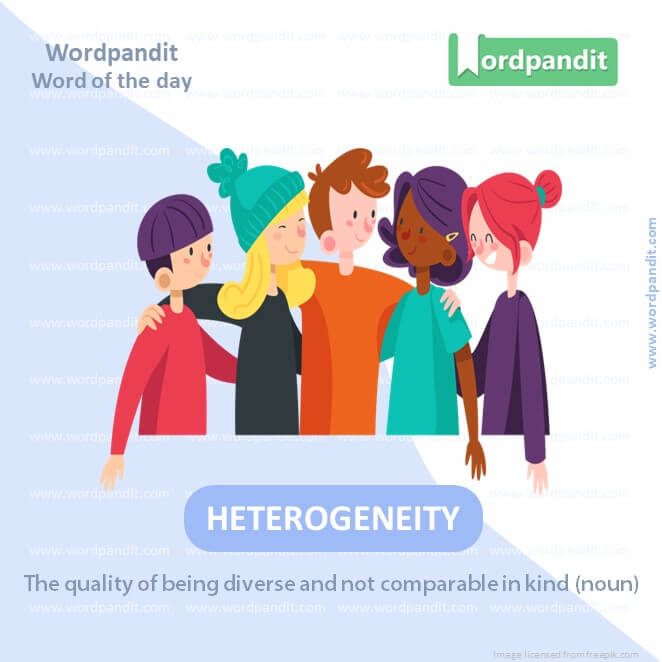
WORD-1: HETEROGENEITY
CONTEXT: A common thread running through major religions is the heterogeneity of interpretations.
SOURCE: Times of India
EXPLANATORY PARAGRAPH: Imagine you have a bag of different types of candies—some are chocolate, some are fruity, and some are chewy. This mix of different kinds of candies is what we call heterogeneity!
MEANING: The quality of being diverse and not comparable in kind (Noun).
PRONUNCIATION: Heh-teh-roh-juh-nee-it-tee
SYNONYMS: Diversity, variance, disparity, dissimilarity, variety
USAGE EXAMPLES:
1. The heterogeneity of the student body made the school unique and interesting.
2. Scientists noticed the heterogeneity in the test results.
3. The heterogeneity of the playlist kept the party lively.
4. The museum’s collection displayed heterogeneity in art styles.
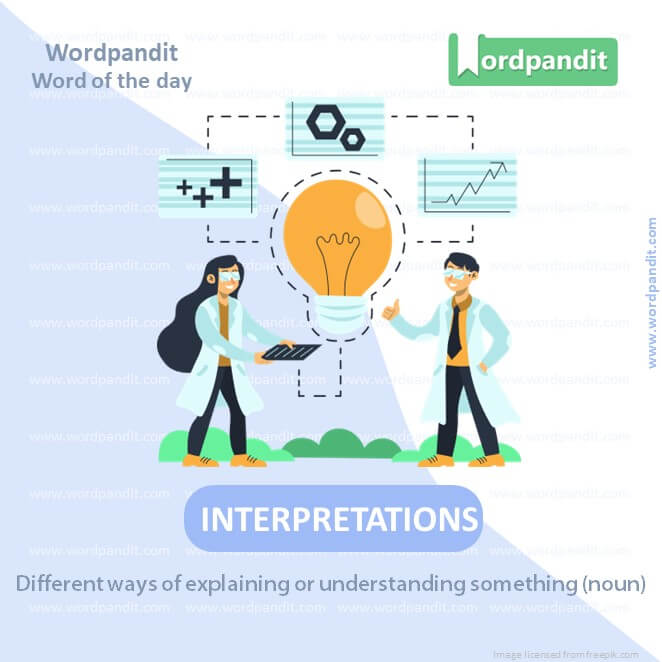
WORD-2: INTERPRETATIONS
CONTEXT: A common thread running through major religions is the heterogeneity of interpretations.
SOURCE: Indian Express
EXPLANATORY PARAGRAPH: Imagine you and your friend see a rainbow. You think it looks like a smile in the sky, but your friend thinks it’s a magical path to treasure. You both have different ways of seeing the same rainbow—that’s called interpretations!
MEANING: Different ways of explaining or understanding something (Noun).
PRONUNCIATION: In-ter-preh-tay-shuns
SYNONYMS: Explanations, understandings, viewpoints, readings, perspectives
USAGE EXAMPLES:
1. The painting left room for many interpretations.
2. The teacher asked for our interpretations of the story.
3. Their interpretations of the law varied widely.
4. Musical performances can have different interpretations.
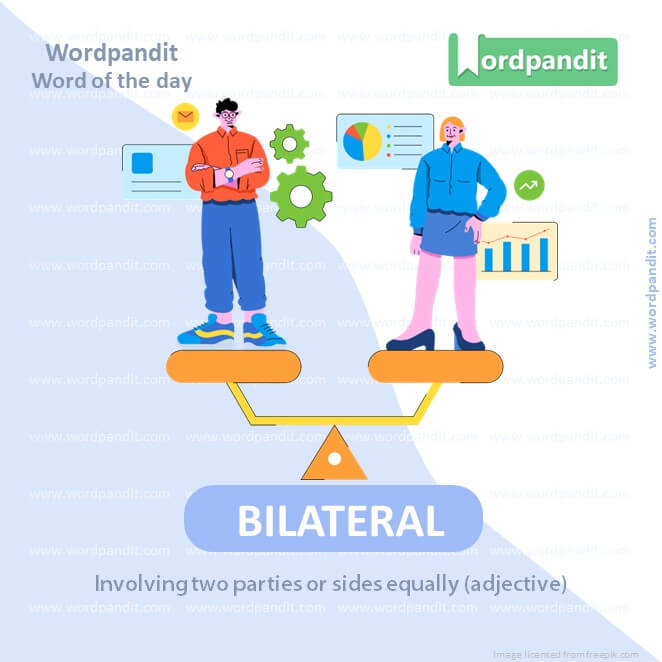
WORD-3: BILATERAL
CONTEXT: As India’s bilateral challenges with China multiply, regional and global multilateralism has emerged at the core of
SOURCE: Indian Express
EXPLANATORY PARAGRAPH: Imagine you and your friend both have a cookie, and you both share half of your cookies with each other. That’s like a bilateral agreement—both sides are doing something!
MEANING: Involving two parties or sides equally (Adjective).
PRONUNCIATION: Bye-lah-teh-rul
SYNONYMS: Two-sided, mutual, reciprocated, joint, shared
USAGE EXAMPLES:
1. The bilateral agreement benefited both countries.
2. They had a bilateral meeting to discuss trade.
3. The bilateral project was a success.
4. The doctors performed a bilateral surgery.
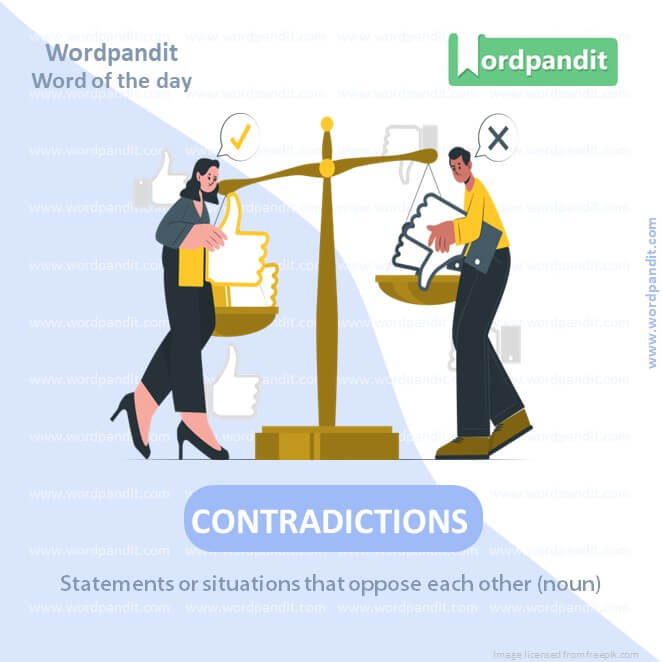
WORD-4: CONTRADICTIONS
CONTEXT: But no sooner than multilateralism got a fresh wind behind its back, the contradictions within the system came to the fore.
SOURCE: Indian Express
EXPLANATORY PARAGRAPH: Imagine you say it’s a sunny day but your friend says it’s raining. One of you must be wrong, right? When two things don’t match, we call them contradictions.
MEANING: Statements or situations that oppose each other (Noun).
PRONUNCIATION: Kawn-trah-dik-shuns
SYNONYMS: Inconsistencies, conflicts, paradoxes, discrepancies, oppositions
USAGE EXAMPLES:
1. The lawyer pointed out the contradictions in the witness’s testimony.
2. There are some contradictions in the two reports.
3. She was full of contradictions.
4. The plot had too many contradictions to be believable.
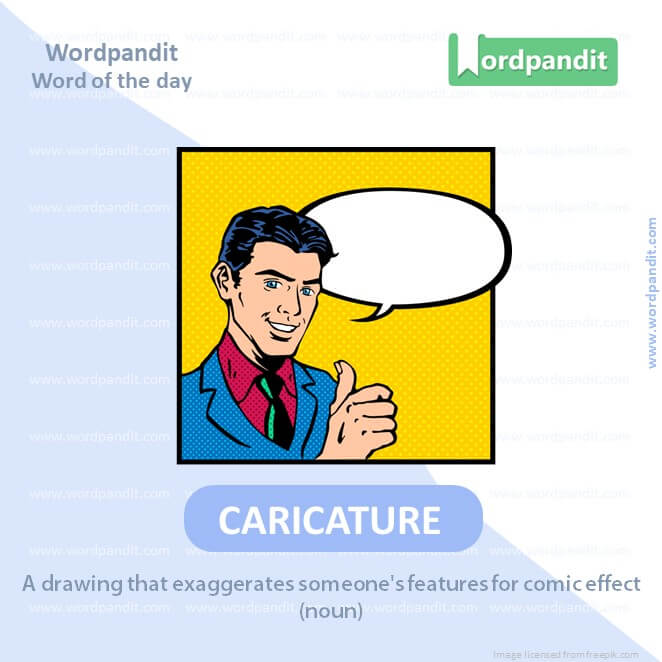
WORD-5: CARICATURE
CONTEXT: Only a resentful, insecure caricature of Sanatan Dharma that the BJP has created can worry about the possibility that their dharma might not survive justice.
SOURCE: Indian Express
EXPLANATORY PARAGRAPH: Imagine drawing a funny picture of your friend where you make their big smile even bigger and their tiny nose even tinier! That’s called a caricature—a silly drawing that exaggerates things.
MEANING: A drawing that exaggerates someone’s features for comic effect (Noun).
PRONUNCIATION: Kare-ih-kuh-chur
SYNONYMS: Parody, satire, cartoon, lampoon, imitation
USAGE EXAMPLES:
1. The artist drew a caricature of the politician.
2. The movie was a caricature of high school life.
3. She felt the caricature was not flattering.
4. He made caricatures of his teachers for fun.
WORD-6: CONTRIVED
CONTEXT: And so to avert their haunting moral gaze, we invert another contrived victimhood.
SOURCE: Indian Express
EXPLANATORY PARAGRAPH: Imagine if you build a sandcastle but you make it look like it was made by a crab. People might say, “Hey, that looks fake!” That’s what contrived means—something that doesn’t seem real or natural.
MEANING: Deliberately created and lacking in natural spontaneity (adjective).
PRONUNCIATION: Kuhn-tryved
SYNONYMS: Artificial, forced, unnatural, staged, fake
USAGE EXAMPLE:
1. The movie had a contrived ending.
2. Her apology felt contrived.
3. The dialogue in the play was contrived.
4. He gave a contrived smile.
WORD-7: VICTIMHOOD
CONTEXT: And so to avert their haunting moral gaze, we invert another contrived victimhood.
SOURCE: Indian Express
EXPLANATORY PARAGRAPH: Imagine if someone takes away your toy and you keep telling everyone how sad you are. You’re focusing on being the person something bad happened to—that’s called victimhood.
MEANING: The state of being a victim, often emphasized or prolonged (noun).
PRONUNCIATION: Vik-tim-hood
SYNONYMS: Suffering, vulnerability, martyrdom, persecution, disadvantage
USAGE EXAMPLE:
1. She was tired of her brother’s constant victimhood.
2. The article explored the psychology of victimhood.
3. He wallowed in victimhood.
4. The movement aims to transform victimhood into empowerment.
WORD-8: ANTIESTABLISHMENT
CONTEXT: But a CM peremptorily branding some journalists as “anti-national and antiestablishment” does the opposite of facilitating better reportage.
SOURCE: Times of India
EXPLANATORY PARAGRAPH: Imagine if you didn’t like the school rules and you wanted to change them. You would be against the way things are normally done—that’s called being antiestablishment!
MEANING: Opposed to the existing social or political systems (adjective).
PRONUNCIATION: An-tee-eh-stab-lish-ment
SYNONYMS: Rebel, nonconformist, insurgent, revolutionary, dissident
USAGE EXAMPLE:
1. The band had an antiestablishment message in their songs.
2. She was an antiestablishment figure in politics.
3. The magazine was known for its antiestablishment views.
4. The antiestablishment protest drew a large crowd.
WORD-9: CONSEQUENTIAL
CONTEXT: The Mandal movement was also consequential but didn’t have as big an impact on areas outside the Hindispeaking belt, which had a long history of reservations.
SOURCE: Times of India
EXPLANATORY PARAGRAPH: Imagine if you don’t brush your teeth, you might get a cavity. The cavity is a consequential thing—it happened because you didn’t brush!
MEANING: Resulting from an action and having significant impact (adjective).
PRONUNCIATION: Kawn-seh-kwen-shul
SYNONYMS: Important, significant, meaningful, impactful, momentous
USAGE EXAMPLE:
1. The consequential decision changed their lives.
2. The speech had a consequential impact on the election.
3. It was a consequential event in history.
4. Failing the test was consequential for his grade.
WORD-10: INTERIM
CONTEXT: On the personal income tax front, in the interim budget of 2019, the government had announced that individual taxpayers with taxable income upto Rs 5 lakh would get a full tax rebate.
SOURCE: Indian Express
EXPLANATORY PARAGRAPH: Imagine if your favorite teacher is sick and another teacher comes just for a few days. That new teacher is the interim teacher—only there for a short time until your favorite teacher comes back!
MEANING: Temporary and intended to be used until something permanent exists (adjective/noun).
PRONUNCIATION: In-teh-rim
SYNONYMS: Temporary, provisional, short-term, stopgap, transitional
USAGE EXAMPLE:
1. He was the interim CEO until they found a permanent replacement.
2. The interim period was filled with uncertainty.
3. She was hired on an interim basis.
4. During the interim, they made several changes.
Vocabulary Importance
In the intricate tapestry of language learning, acknowledging ‘vocabulary importance’ forms a vital thread. Vocabulary refers to the collection of words and phrases that one knows and can use. Understanding ‘vocabulary importance’ involves recognizing the impact of a rich and diverse vocabulary on effective communication, reading comprehension, and overall linguistic prowess.
To comprehend ‘vocabulary importance’, one must actively observe the role of vocabulary in everyday communication. A strong vocabulary allows for clearer expression of thoughts, emotions, and ideas and results in more informative and engaging conversations. This observation creates appreciation for ‘vocabulary importance’, initiating the journey towards vocabulary expansion.
Immersing oneself in a range of reading materials such as books, articles, and essays underscores the ‘vocabulary importance’ by exposing learners to diverse word usage across various contexts. Regular reading habit not only introduces new words but also showcases the effectiveness of a robust vocabulary in conveying complex thoughts.
Writing plainly highlights ‘vocabulary importance’ as well. Regularly practicing writing, attempting to use various words and phrases, helps cultivate a deeper appreciation for vocabulary. From honing argumentative skills to descriptive ability, a broad vocabulary aids in enhancing all dimensions of writing.
Furthermore, engaging in intelligent conversations and debates brings forward the ‘vocabulary importance’. During discussions that require critically articulating thoughts and ideas, a wide-ranging vocabulary allows for persuasive argumentation and thoughtful expression.
In essence, understanding and acknowledging ‘vocabulary importance’ involves a blend of observation, learning, and practice. However, it is crucial to remember that learning vocabulary should not become a mere memorization task. Instead, it should be about exploring the richness of language and enjoying the process, thereby wholeheartedly acquainting oneself with the ‘vocabulary importance’. This approach fosters a more profound and genuine vocabulary mastery, ultimately making language learning a more fruitful endeavor.













